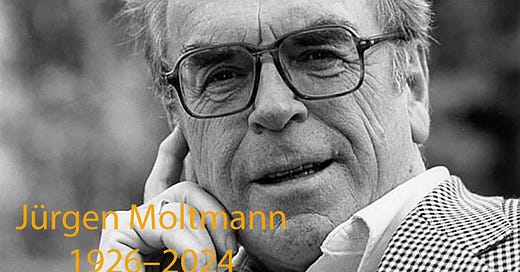Remembering Jurgen Moltmann
I often turn to different theologians for various reasons. I believe that in order to have a "healthy" and "holistic" theology, we need to consult various theologians who can offer different perspectives on the gospel, providing a deeper understanding of who God is. Much like scripture itself, figures throughout church history speak to us at different times and to different audiences for different reasons.
Jürgen Moltmann's theology was informed by his personal experience of encountering Christ. As a young man, he was conscripted into the Nazi army, where he soon surrendered to the British army and was held as a prisoner of war. Moltmann has said that this is where he first encountered Christ. He was given a Bible, and upon reading the book of Mark, he read the cry of dereliction for the first time and felt, "There is a divine brother who feels the same as I did at that time. This saved me from self-destruction and despair."
Perhaps it was through Moltmann's own experience that I found a theologian who, unlike others, spoke to my own experience of depression and anxiety.
I remember reading his book, The Crucified God, for the first time during a season of deep depression. Moltmann's theology of the cross helped me encounter the same God he did when he was a prisoner of war. For Moltmann, in order to understand who God is, we must first look toward the cross. The cross is God's ultimate act of self-revelation. In other words, if we want to know God's will and character, we look to the cross. Thus, paradoxically, God is known in Christ's own godforsakenness.
"When God becomes man in Jesus of Nazareth, he not only enters into the finitude of man, but in his death on the cross, he also enters into the situation of man's godforsakenness. In Jesus, he does not die the natural death of a finite being, but the violent death of a criminal on the cross, the death of complete abandonment by God. The suffering in the passion of Jesus is abandonment, rejection by God, his Father. God does not become a religion, so that man participates in him through corresponding religious thoughts and feelings. God does not become a law, so that man participates in him through obedience to a law. God does not become an ideal, so that man achieves communion with him through constant striving. He humbles himself and takes upon himself the eternal death of the godless and the godforsaken, so that all the godless and the godforsaken can experience communion with him."
God, thus, identifies with the ungodly. In Christ, God becomes the godforsaken for the godforsaken. In my moments of deep depression, it has been a comfort to my soul to know that the same feeling of godforsakenness I felt was also felt by God made flesh. In these moments, I am reassured that God has taken on this godforsakenness for me.
May Jürgen Moltmann rest in eternal peace.




